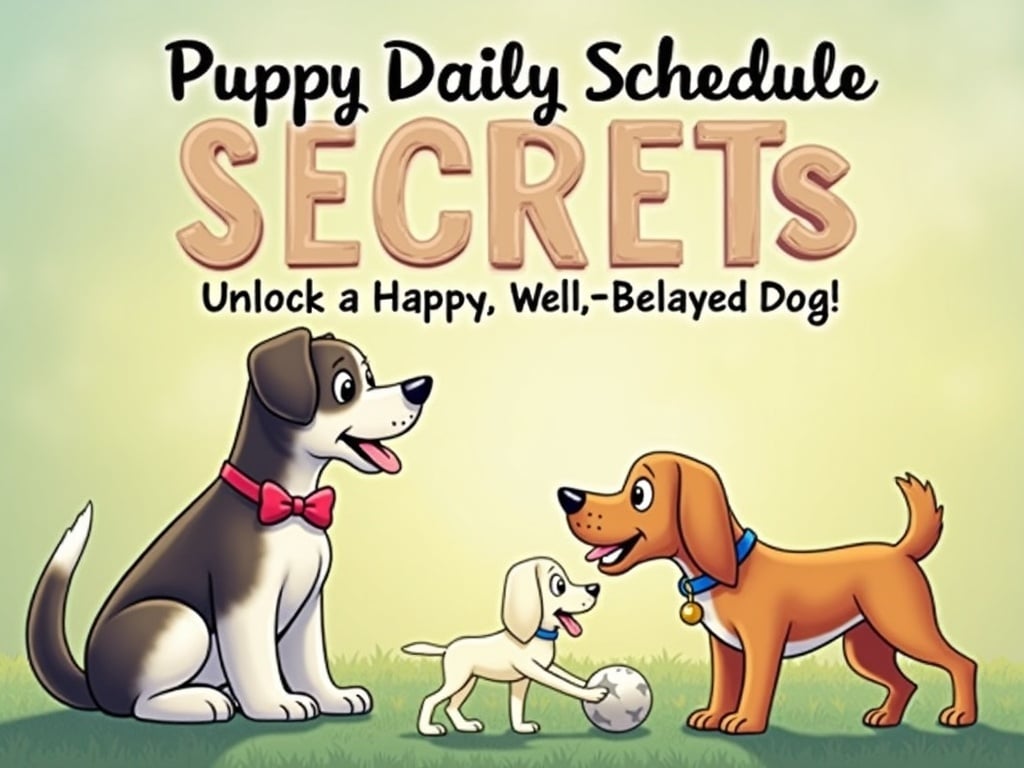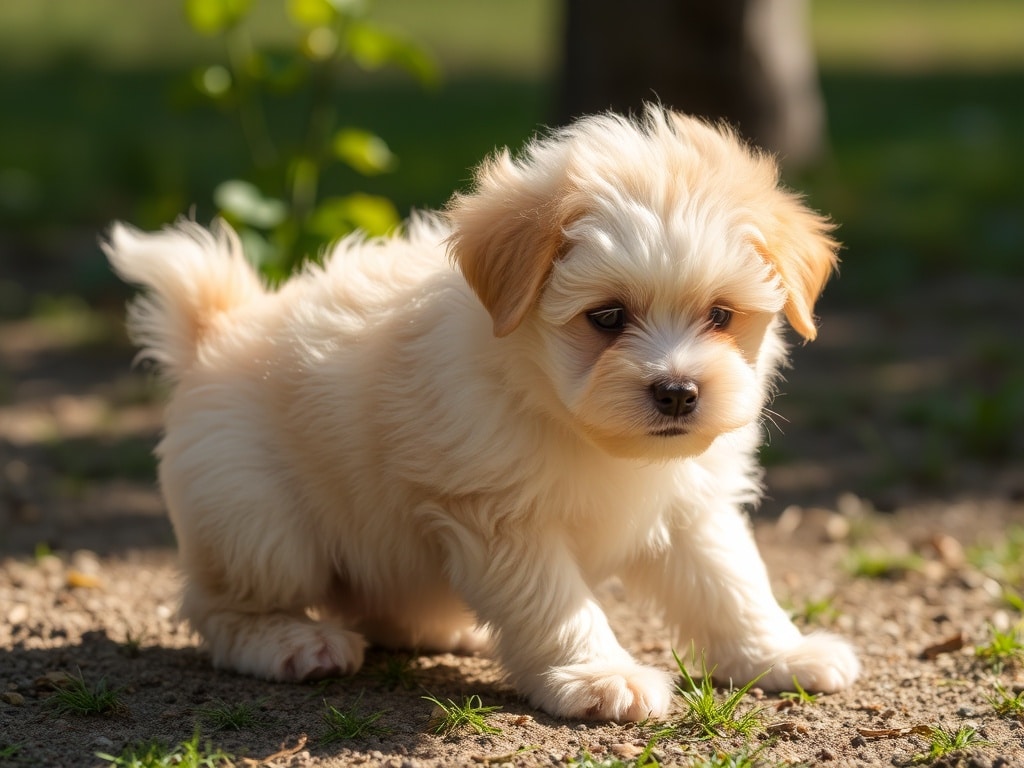Puppy Daily Schedule Secrets: Unlock a Happy, Well-Behaved Dog!
Bringing a new puppy home is an incredibly exciting time. Those first few weeks are filled with adorable moments, playful antics, and the start of an unbreakable bond. But let’s face it, raising a puppy can also be challenging! One of the most effective tools for managing the chaos and ensuring your furry friend grows into a well-adjusted dog is a structured puppy daily schedule. Think of it as your secret weapon for a happy, healthy, and well-behaved companion.
What are the Benefits of a Structured Puppy Daily Schedule?
A puppy daily schedule isn’t just about rigid timetables; it’s about creating predictability and routine. This predictability offers a multitude of benefits for both you and your new best friend:
- Reduced Anxiety: Puppies thrive on routine. Knowing what to expect each day helps them feel secure and reduces anxiety, particularly in a new environment.
- Improved Potty Training: A consistent potty break schedule is crucial for successful housebreaking. Regular trips outside will minimize accidents indoors.
- Better Sleep Habits: Regular nap times and a consistent bedtime routine promote healthy sleep patterns, which are vital for a puppy’s physical and mental development.
- More Manageable Energy Levels: Scheduled playtime and exercise help expend pent-up energy, reducing hyperactive behavior and preventing destructive chewing.
- Enhanced Training: Integrating short training sessions into the daily schedule reinforces good behavior and helps your puppy learn basic commands quickly.
- Stronger Bond: A consistent schedule provides opportunities for positive interaction, playtime, and affection, strengthening the bond between you and your puppy.
- Preventing bad behaviour: When a puppy knows their needs will be met on time, they avoid developing bad behaviour.
Creating a Sample Puppy Daily Schedule (by Age)
Keep in mind that these are just sample schedules. You’ll need to adjust it based on your puppy’s individual needs, breed, and energy levels. Watch your puppy’s cues and be flexible!
8-Week-Old Puppy Schedule
At this age, your puppy needs frequent potty breaks, short play sessions, and lots of sleep.
- 6:00 AM: Wake up, potty break, breakfast.
- 7:00 AM: Short playtime (15-20 minutes).
- 7:30 AM: Nap time (1-2 hours).
- 9:30 AM: Potty break, short playtime (15 minutes).
- 10:00 AM: Nap time (1-2 hours).
- 12:00 PM: Lunch, potty break.
- 1:00 PM: Gentle playtime and socialization (meeting new people or exploring new sounds).
- 1:30 PM: Nap time (1-2 hours).
- 3:30 PM: Potty break, short training session (5-10 minutes).
- 4:00 PM: Nap time (1-2 hours).
- 6:00 PM: Dinner, potty break.
- 7:00 PM: Relaxing playtime.
- 8:00 PM: Potty break.
- 8:30 PM: Bedtime.
- Middle of the night: Potty break as needed.
12-Week-Old Puppy Schedule
Your puppy is becoming more active and can handle slightly longer play and training sessions.
- 6:30 AM: Wake up, potty break, breakfast.
- 7:30 AM: Playtime (20-30 minutes).
- 8:00 AM: Short training session (10 minutes).
- 8:30 AM: Nap time (1.5-2 hours).
- 10:30 AM: Potty break, enrichment activity (puzzle toy).
- 11:00 AM: Nap time (1.5-2 hours).
- 1:00 PM: Lunch, potty break.
- 2:00 PM: Socialization walk (introduce to new sights and sounds).
- 2:30 PM: Nap time (1.5-2 hours).
- 4:30 PM: Potty break, training session (10-15 minutes).
- 5:00 PM: Playtime.
- 6:00 PM: Dinner, potty break.
- 7:00 PM: Relaxing playtime.
- 8:00 PM: Potty break.
- 8:30 PM: Bedtime.
- Late night: Potty break as needed.
4-Month-Old Puppy Schedule
At this age, your puppy can stay awake for longer periods and needs more exercise and mental stimulation.
- 7:00 AM: Wake up, potty break, breakfast.
- 8:00 AM: Exercise (walk or play fetch for 30-40 minutes).
- 8:45 AM: Training session (15 minutes focus on basic commands).
- 9:15 AM: Potty break.
- 9:30 AM: Nap time (1-2 hours).
- 11:30 AM: Potty break, enrichment activity (puzzle toy, chew toy).
- 12:30 PM: Lunch.
- 1:30 PM: Socialization outing (dog park, pet store).
- 2:30 PM: Potty Break
- 3:00 PM: Relax time / nap (1 hour).
- 4:00 PM: Training.
- 4:30 PM: Potty break.
- 5:00 PM: Playtime with family.
- 6:00 PM: Dinner, potty break.
- 7:00 PM: Relax time with family.
- 8:00 PM: Potty break.
- 9:00 PM: Bedtime.
Feeding Schedule: How Much and How Often Should I Feed My Puppy?
Puppies need frequent meals to support their rapid growth. Here’s a general guideline:
- 8-12 weeks: 4 meals a day
- 3-6 months: 3 meals a day
- 6-12 months: 2 meals a day
Consult your veterinarian or the food packaging for specific feeding amounts based on your puppy’s weight and breed. Always use a high-quality puppy food.
Potty Training Schedule: Establishing Regular Potty Breaks and Preventing Accidents
Consistency is key to successful potty training. Take your puppy out frequently, especially:
- First thing in the morning
- After meals
- After naps
- After playtime
- Before bedtime
Reward your puppy immediately after they eliminate outside with praise and a small treat. Clean up accidents indoors thoroughly with an enzymatic cleaner to eliminate odors and discourage repeat offenses.
Exercise and Playtime Schedule: How Much Exercise Does a Puppy Need?
Puppies have a lot of energy, but over-exercising them can be harmful to their developing joints. Stick to short, frequent play sessions and avoid strenuous activities like long runs or high jumps. Here’s some good advice:

- 8-12 weeks: 5-10 minutes of playtime several times a day.
- 3-6 months: Gradually increase playtime to 15-20 minutes, twice a day.
- 6+ months: Continue to increase exercise gradually, tailoring it to your puppy’s breed and energy level.
Activities like fetch, tug-of-war (gently!), and short walks are great options. Check out Is Your Puppy a Genius? Puzzle Toys to Boost Your Dog’s Brainpower for mental excercise!
Training Schedule: Simple Commands and Socialization Exercises
Start training your puppy early! Keep training sessions short, positive, and fun. Focus on basic commands like:
- Sit
- Stay
- Come
- Down
Socialization is also crucial during puppyhood. Expose your puppy to a variety of sights, sounds, people, and other animals in a safe and controlled manner.
Nap Time and Sleep Schedule: Why is Rest Important for Puppies?
Puppies need a lot of sleep – typically 16-20 hours a day! Adequate rest is essential for their physical and mental development. A consistent nap time and bedtime routine will help your puppy learn to settle down and relax. Create a quiet, comfortable space for your puppy to sleep, such as a crate or dog bed.
Grooming Schedule: Introducing Your Puppy to Grooming Early On
Start grooming your puppy early to get them used to the process. Regular grooming helps keep their coat healthy and free of mats, and it’s also a great opportunity to bond with your puppy. Here’s what to include:
- Brushing: Brush your puppy several times a week, depending on their coat type.
- Nail Trimming: Trim your puppy’s nails as needed, usually every 2-3 weeks.
- Bathing: Bathe your puppy only when necessary, as excessive bathing can dry out their skin.
- Ear Cleaning: Clean your puppy’s ears regularly to prevent infections.
Adjusting the Schedule as Your Puppy Grows: Adapting to Changing Needs
Your puppy’s needs will change as they grow. Be prepared to adjust the daily schedule accordingly. As your puppy gets older, they’ll need less sleep, more exercise, and fewer meals. Pay close attention to your puppy’s cues and adjust the schedule as needed.
Troubleshooting Common Problems with a Puppy’s Schedule: What to Do If Things Aren’t Working
Even with a well-planned schedule, you may encounter some challenges. Here are some common problems and how to address them:
- Accidents Indoors: Go back to basics with potty training, take your puppy out more frequently, and clean up accidents thoroughly.
- Excessive Barking or Chewing: Ensure your puppy is getting enough exercise and mental stimulation. Provide plenty of chew toys and rotate them regularly.
- Difficulty Settling Down for Naps: Create a quiet, comfortable sleep space and establish a consistent nap time routine.
- Refusal to Eat: Make sure your puppy’s food is fresh and palatable. If your puppy is still refusing to eat, consult your veterinarian.
Conclusion
Implementing a puppy daily schedule is an investment that pays off in countless ways. It creates a foundation for a happy, healthy, and well-behaved dog. Remember to be patient, consistent, and flexible, and enjoy the incredible journey of raising your new furry friend! With a little planning and dedication, your puppy will thrive and become a cherished member of your family.

